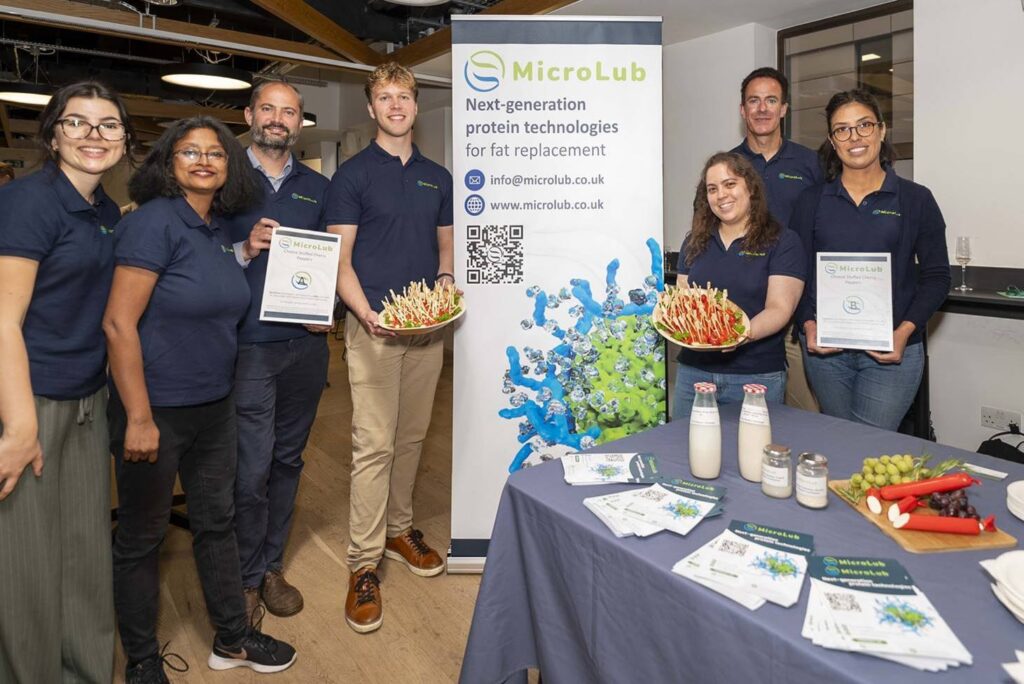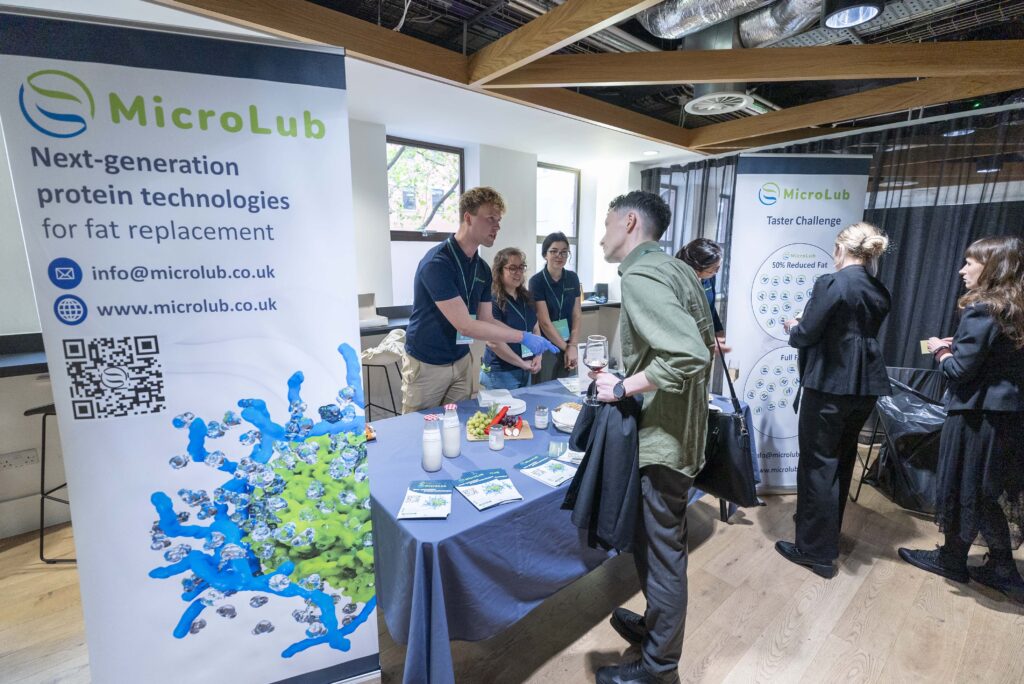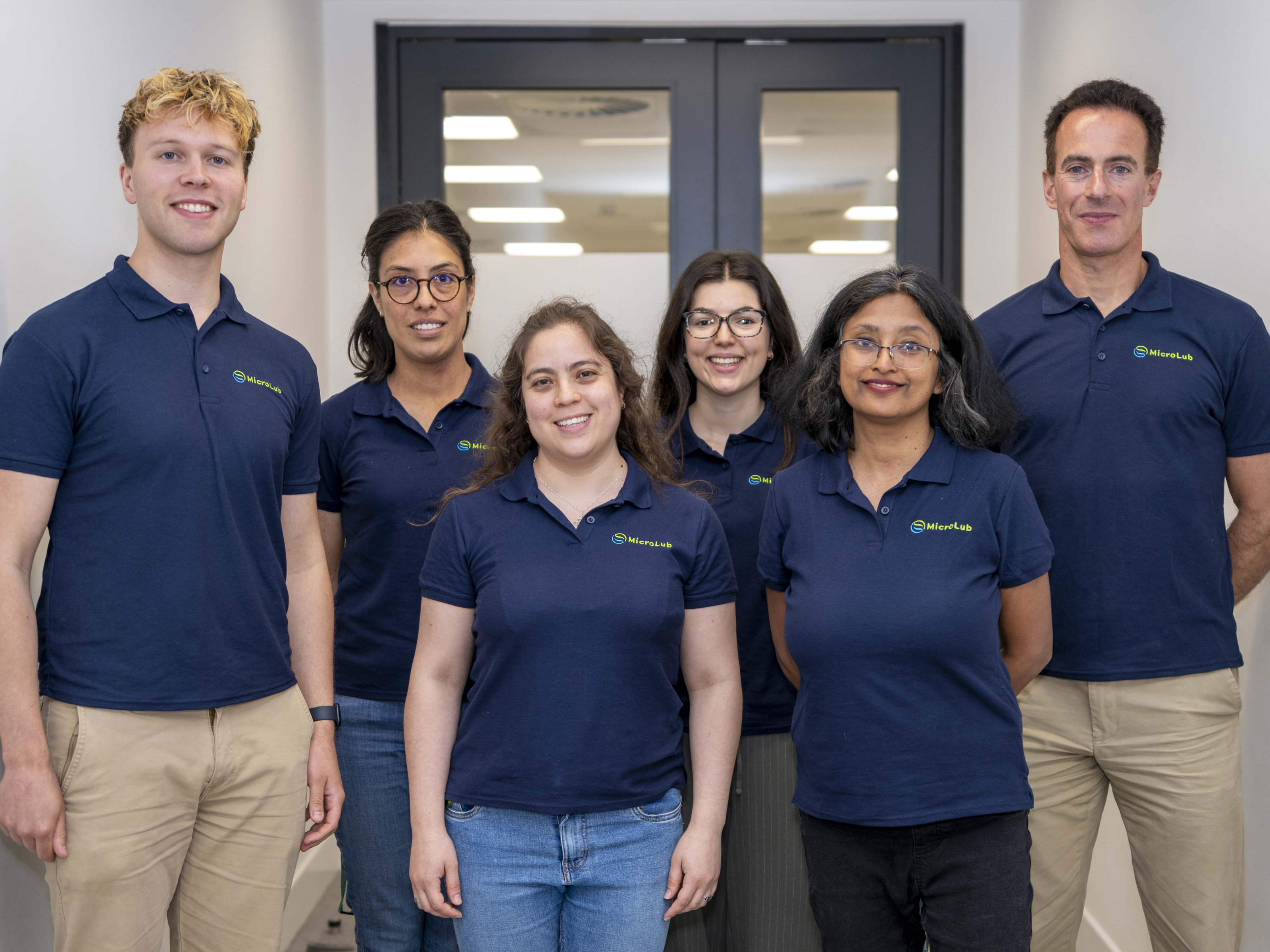5 Mins Read
UK deep tech startup MicroLub has closed a £3.5M ($4.5M) funding round to replace fats and oils with its plant-based microgels.
Oil and water may not go together, but who says they have to?
For one British startup, water can functionally replace oils, addressing a host of issues related to the world of fats, ranging from environmental stress to public health.
MicroLub, a spinout company from the University of Leeds’s Sarkar Lab (named after founder and CTO Anwesha Sarkar), has fattened its wallet with a £3.5M ($4.5M) investment round.
The company argues that while fats and oils make food tastier and texturally appealing by adding “lubricity” and a “creamy” mouthfeel, they also increase calorie content. To overcome that challenge, the startup is betting on microgels of plant proteins, developed through the formation of protein and water gels that are broken into microparticles using a homogeniser. These microgels release water when chewed to create the creamy mouthfeel associated with fats.
This can slash the fat content of a product by up to 75%, though a 50% reduction is more common – in one trial, MicroLub cut the fat content in soft cheese by half (alongside 35% fewer calories), but taste testers were unable to tell the difference from conventional cheese.
“When we discovered the technology and tested lubricity, we knew it had many potential applications, which we can now explore further and commercialise with this investment,” said Sarkar.
The company already has three patents for fat replacement, texture enhancement and nutrient delivery technologies, which it will look to commercialise with the funds. The proceeds will enable it to develop new products with partners, scale up its tech with co-manufacturers, and build its team.
How MicroLub swaps out fat with water

“Molecular friction lies at the heart of any sensory experience – whether it’s a creamy yoghurt, a juicy burger, or a soothing skin cream, our perception is determined by the interaction of molecules within the product and with our bodies,” MicroLub CEO David Peters told Green Queen.
“Our innovative approach focuses on leveraging cutting-edge science to pioneer the next generation of protein technologies, to develop proprietary ingredient solutions that dramatically reduce molecular friction. We do this by adding lubrication to food products, using protein microgels coated with polysaccharide hydrogels,” he explained.
“Proteins and polysaccharides are already found in many food products, but the way in which we combine them mimics the ‘fatty sensation’ of full-fat products, adding texture, richness, and succulence in low-fat or plant-based foods.”
Since this is a platform technology, it works well with a wide range of proteins. “Our customers can choose which protein they want to use – whether that’s pea, soy, oat, fava bean, or even dairy proteins – as well as which polysaccharide,” said Peters.
“The optimal combination and ratio in which they are being combined will depend on which type of application the technology is being used in. For example, the ideal protein/polysaccharide combination for a plant-based burger will differ from that for a low-fat yoghurt.”
Those are just two examples of the kind of products that the microgel can be used in. “Baked goods, spreads and confectionery are among the other categories in which we have customers using our technology,” revealed Peters.
And who might those customers be? “We are in advanced talks with a number of potential partners to commercialise our technology,” he said, describing a three-step strategy for the business.
“The first phase in that process involves collaborating with those partners to develop products made with MicroLub-based ingredients. The second phase involves scaling up the technology and incorporating it into our partners’ manufacturing facilities, before entering the final phase, which will see us license the technology to our partners, so they can launch commercial products.”
Cutting down saturated fats and ingredient lists

The $3.3B fat replacement market has many challenges, as a recent report by British chef and writer Anthony Warner pointed out. “There is often a focus on protein when we talk about food system health and sustainability, but fat is equally important,” it stated.
Animal fats are already linked with environmental, ethical and health concerns, while tropical oils like coconut or palm – often the only functional alternatives to the former – present significant sustainability and biodiversity issues, largely due to deforestation.
Peters noted how reduced-fat and plant-based foods have “struggled to achieve anything like their full sales potential, because of issues around texture, mouthfeel and astringency.” Microgels are especially effective in these products, he said.
It’s also among solutions that process existing ingredients via different approaches, freeing them from novel food regulations and paving the way for faster market entry than other alternative fats. “They are not the solution to all the problems surrounding fat, but they do offer a suite of different approaches to food innovators looking to improve their products,” Warner told Green Queen in August.
MicroLub isn’t looking to remove the entire fat content of a product. “Our technology requires there to be some [fat] present for structure and to perform certain functions, such as melting,” explained Peters. “But we can significantly reduce the fat content without any noticeable change to texture or mouthfeel. In addition, we enable our customers to remove thickeners and emulsifiers from their products, thereby shortening their ingredient lists and creating clean-label products.”
While unhealthy saturated fats are contributing to the growing obesity epidemic – half the world is on track to be overweight or obese in the next decade – fat is still a crucial macronutrient. MicroLub’s water-based solution, Peters argued, improves the nutritional profile of products by replacing saturated fat with protein and water.
“Our second-generation technology, which still uses proteins and polysaccharides but combined in a different structure, enables high-loading of nutrients without affecting the texture or taste of the product,” he added. “This enables our customers to create genuinely healthy products which are packed full of nutrients.”
Now, MicroLub is looking to build out its R&D team to dedicate resources for collaborative projects with partners. “We expect to be entering into a number of joint development agreements, as well as continuing to develop the technology and file additional patents,” said Peters.



